Robie and I have a lot of stuff. Anyone who’s been to our house will agree. As the kids have gotten older, this has really become a problem.This post starts with some “how to get organized stuff” but the substance comes after and recounts some, hopefully interesting, stories.
On a recent visit to Montana, my mother-in-law mentioned a book that I’d already heard about before:


I responded positively to her when she spoke of it, so she gave me a copy, and on the drive home Robie read it. There are two things from our discussions about it that resonated with me:
- Clutter, is usually a matter of having defined homes for everything you own. Not putting things away is often a matter of not having a place to put it.
- You should only own things that give you joy. We go through life holding onto a lot of stuff that has little meaning for us. This detracts from the stuff we hold dear.
So instead of building more and more storage, the first step is to get rid of anything we don’t care about and the book recommends starting with clothes. Here’s the process:
- put all your clothes and put them into a pile.
- pick up each item and decide whether it gives you joy. Whether you wear it regularly doesn’t matter. I have stuff I wear often that doesn’t really match me. I also have stuff that I have that I’ll never wear again, but seeing it makes me smile.
- somewhat in contrast to #2, you shouldn’t keep stuff just as a keepsake. Treasure your memories but don’t allow them to clutter your life.
It’s #3 that this post is about.
So I created a big pile (note that this is a queen size bed):

As I went through it, I found lots of stuff to discard. I also came across a bunch of stuff that made me think, “This makes me think of X”. It brought up nice memories. I had no need to save the item, but I still wanted a way to capture the sentiment.
Below are pictures of the items, mostly shirts, and a recount of each. These are mostly in chronological order.
Back in my
MIT days, I liked to wear tank tops. Like many male 20 somethings, I spent a bunch of time lifting weights. I actually did manage to gain some muscle.
1 So I often wore tank tops.

My junior year, I participated in freshman orientation, which included some community service. Since part of the point of such service is community relations, we all got shirts. This is one of them. After graduation, I used it as a “workin shirt”. Anything that involved grease, paint, or whatever.
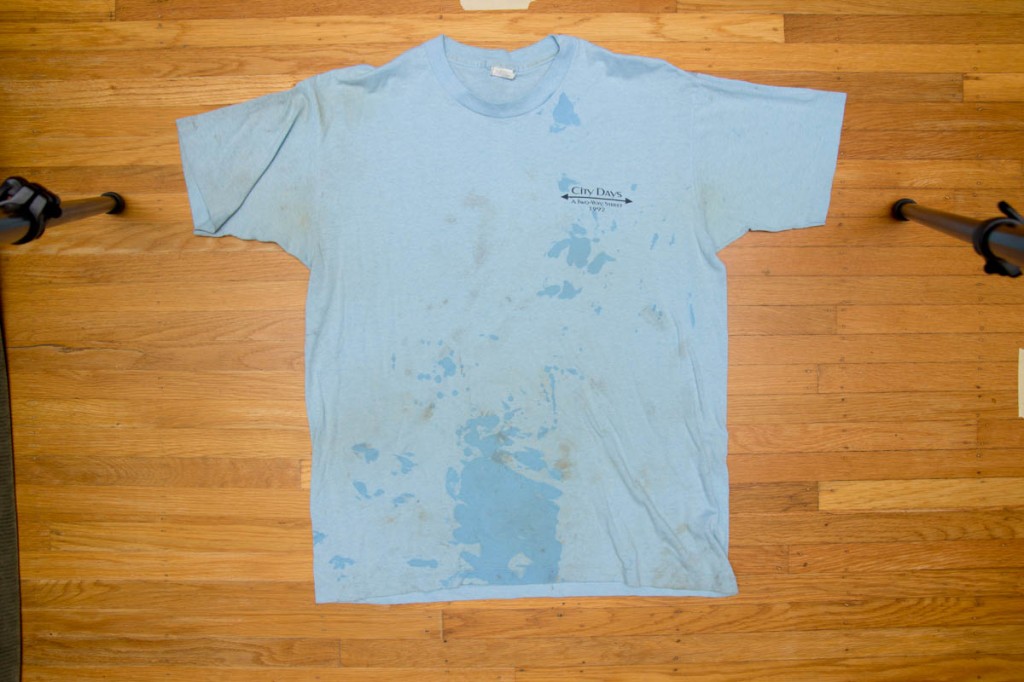
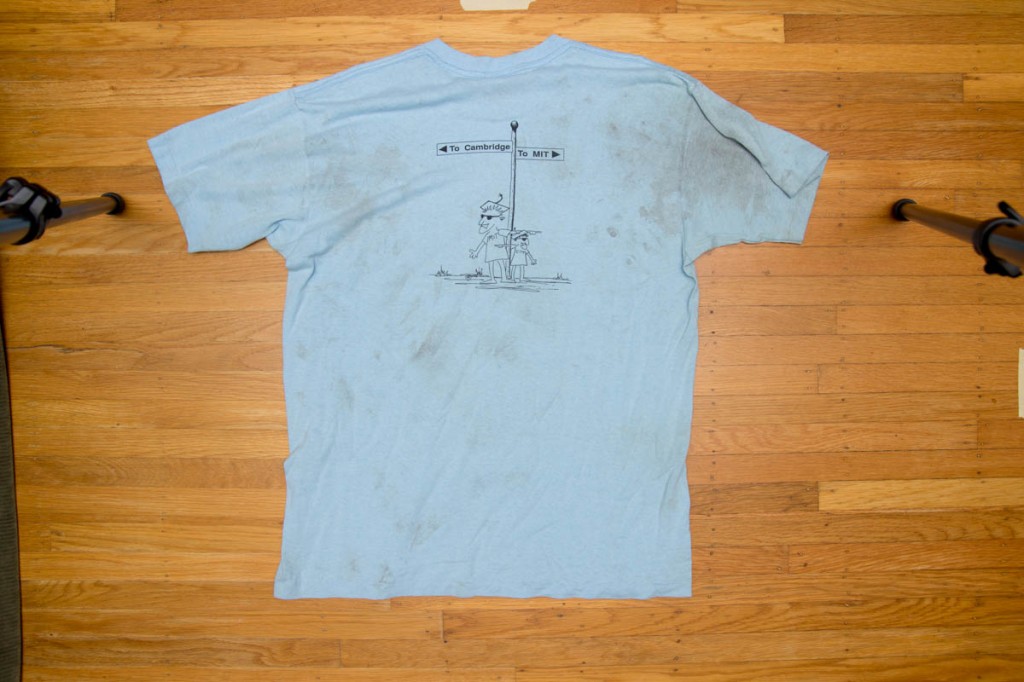
Most of my career at Intel involved developing/supporting physical design semiconductor CAD tools. In the first year or two, I had the opportunity to go to
DAC where I got this ISS shirt. This shirt is from the company ISS, whose vericheck tool we’d recently started using within Intel. The funny thing about it is that we referred to it as ISS. “Did you run ISS?” We also had internally developed stuff to integrate it. ISSin (convert our data to something the tool accepted). ISS was eventually acquired by Avanti! which was bought by Synopsys and Vericheck morphed into Galaxy. I’m not really sure what Intel uses now; it’s probably still Galaxy
2.
The DRC comment on the shirt refers the DRaCula tool offered by Mentor (I think it was Mentor). DRC is Design rule checking.


This next sweatshirt was given to me by my friend Dorothy, a Wellesley woman I spent a lot of time with. I got it from her for Christmas when she came to visit me and a bunch of other
PKT guys after we graduated. Since she was sleeping on my couch, I think she felt obligated to give me something. Either way, I wore it a lot. Note the raggedy sleeves.

During the 5 years I lived in Silicon Valley, I spent a lot of time “Goin drinkin”, in particular at a dance place called Toons. One of the draws of Toon is their $0.50 10oz beers before 10pm. On many of the nights we’d order 20 of them at 9:55. $10 with a $10 tip. The server wasn’t supposed to do it, and it was through this that I learned the magic of tipping.
On one of the nights that I was there, a local radio station gave away tshirts. Fast forward almost 10 years. I’m working in Oregon talking to my friend/coworker TimJ and he’s wearing the same shirt. Noticing this, I unbutton my collar shirt to reveal my copy. After chatting about it for a minute or two, we decided that we both got our shirts on the same night. Tim spent a bunch of time at Toons as well. Ships passing/dancing in the night.

This sesame street shirt is from my cartoons phase. In addition to this shirt, I also wore a Wiley Coyote hat, an Elmo shirt, and some Winnie the Pooh stuff. The latter spilled over into my friendship/relationship with Rose
3 The funny thing about this phase is that I didn’t really watch the corresponding shows as a kid. I guess I watched some Sesame Street
4. Even now that I have two kids, I don’t know a whole lot about Winne the Pooh.

For about two years of my time in Mountain View, I was an assistant scoutmaster with a local troop. I learned a lot through this experience:
- The Stanford BSA council is awesome. The adult training was fantastic. I may have learned more than I ever taught my protoges.
- I learned to sew patches. I went to the local fabric shop and the sales lady mostly blew me off until she saw that the patches I was trying to sew were scoutmaster ones. 5
- I learned that the most difficult part of volunteering with kids is dealing with the parents.
- Most significantly, I found the youth protection training to be really eye opening. Ever since, I’ve always been careful when dealing with kids, especially ones I don’t know. It’s not that there has been anything to hide, but it’s the perceptions that matter. For example, today I never push anyone else’s kid on the swing, unless I know the parents.

These two shirts were the result of a shopping trip with my friend Emily. Clearly the green shirt got some usage. The orange one also spent a lot of time outside my closet. The thing about it is that I fealt self-conscious about it the first time I wore it. I kept thinking to myself “I’m wearing an orange shirt”, until my coworker Nicole complimented me on it. Today, I probably own more clothes in Orange than any other color. I’m thankful to Emily for expanding my fashion boundaries.

Shortly after starting work at Intel, they had a blood drive. The MIT red cross people were great at getting people to donate. I basically gave as frequently as the law allowed. (today, the limit is every 56 days.) A couple weeks after my donation, I got a letter from Stanford medical stating that my blood is negative of a common virus
CMV. Most adults are positive and a CMV infection is generally no big deal. The main exception is chemo patients and other people with compromised immune systems. I was asked to do platelet/
apheresis donations. They put you in a chair, jam a needle in one arm, somehow separate platelets, and return the rest into a needle jammed into the other arm. You sit there for about an hour and a half. They have a nice setup at Stanford; each chair has a tv for watching movies, but most of the time, I just chatted with the nurses who both had sons trying to figure out what to do with their lives. Since I had gone to MIT, and presumably had figured it out, they looked to me for some reassurance.
I did this kind of donation probably 10 or 15 times. It was conveniently located since I was dating Maggie, a Stanford student, at the time. More significant to my memory of these shirts is a comment my friend Linda made. “Stanford blood center. you should wear that shirt to bars. Women will be reassured that you’re safe.”

This shirt is one I bought in Germany with my sister Jovan. Jovan was probably 12 at the time and her friends shopped a lot at a little place not far from her school. I remember flirting a bit with the shop owner who was about my age, perhaps a bit older. Through most of my life, this wouldn’t have been that memorable, but it coincided with me
finally figuring out the dating thing. I was 24 or 25 at the time. It’s a great shirt and I was tempted to start wearing it again.

This shirt was bought for me by a girlfriend, Nurith but it was a shopping excursion with her that I initially associated with it during my cleanup.
Nurith and I were at a GAP store in the closeout section. A sales guy came over to see if I needed help. He was a great salesperson, and most important to this memory, probably gay. After we left the store, Nurith commented, half joking, in a catty accent, “I can’t
believe he would stand there checkin out
my man, right there in front of me!”

This next shirt is a reflection of my side stripes phase. In particular, I remember my first Friday evening living in Israel. I put it on, and went to a local restaurant for dinner. I asked the waitress, where the local dance places are
6. There were a couple issues with this:
- Like Europeans, Isreali dance places don’t open til after midnight. It was 7 when I was asking and was ready to get moving.
- Even if I did look at the right time, the places aren’t always obvious to find
- Isreali dance places are for dancing, not picking up.
Eventually, weeks later, I did find some night life but it was rather different from my American experience. Still enjoyable, but different.

The clothes below were from my Eddie Bauer khaki period. They reflected my dressier side. For about half of my time in Israel, I dated Shlomit and being Israeli, we spent many Friday evenings at her mom’s for dinner with her family. One weekend, while visiting her sister Hani (The H is pronounce like the h in Hanuka), Hani noticed my clothes. Her husband Dror is a banker and she was looking for more casual stuff for him. This was my dressy attire.
I still find that Eddie Bauer fits me best, but it’s not a regular part of the rotation anymore. Khaki is a thing of the past.

This Hooters shirt was given to me by Kelli when she returned from a wedding in Florida. The funny thing is that the couple getting married was on the religious side. The husband was intending to be a chaplain in the Army. Hooters is probably not a place they go to very often.
7
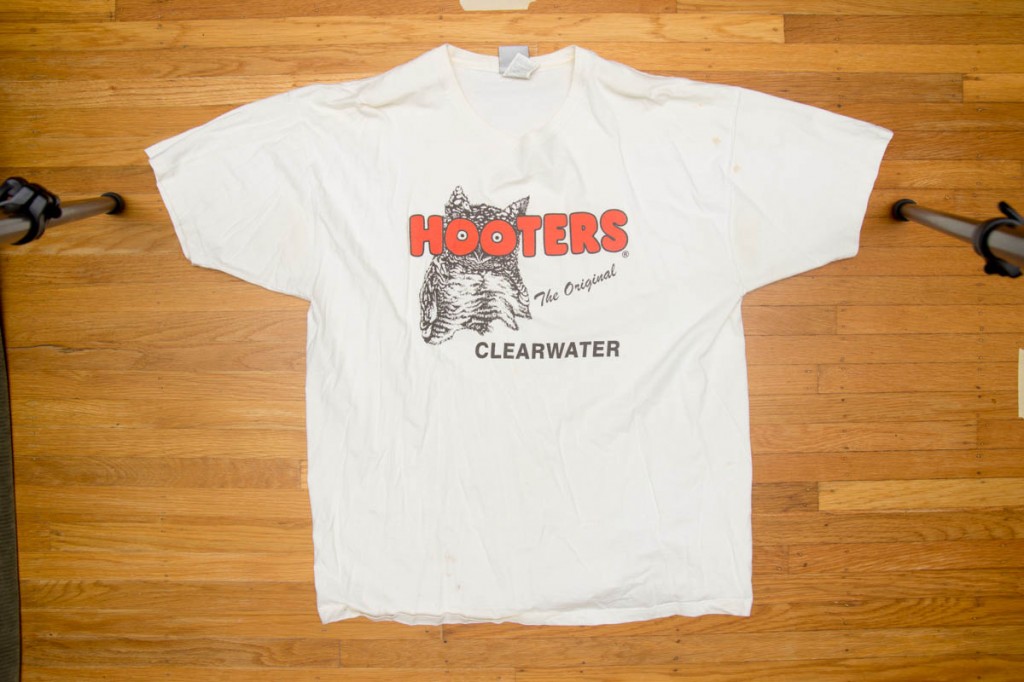
This
Tommy Hilfiger shirt was purchased for my engagement pictures with Kelli. I think I only wore it once. It’s a great shirt. It fits well and looks good on me. After Kelli and I split from our short (1.5 years) marriage, it felt inappropriate to wear it.

Being an engineer, I’ve worked with many Indians. Over the years, I’ve heard many accounts of getting custom tailored clothes cheaply in India. I’ve never been to India, but my friend Balaji did offer to help me out. I gave him a shirt I liked (the orange one above, as it happens) and he came back with these three. They are excellent shirts, well made. The problem is that they pinch my shoulders/lower neck a bit. Sorry shirts.

This shirt was given to my by Gyuszi on a trip to Hawaii. Somehow, since I’m probably the only black guy he knows
8 he associates me a little with rap type of culture. Note the slogan at the bottom “in search of booty…”. I see Gyuszi as a dear friend and don’t take any offence at his cultural references.
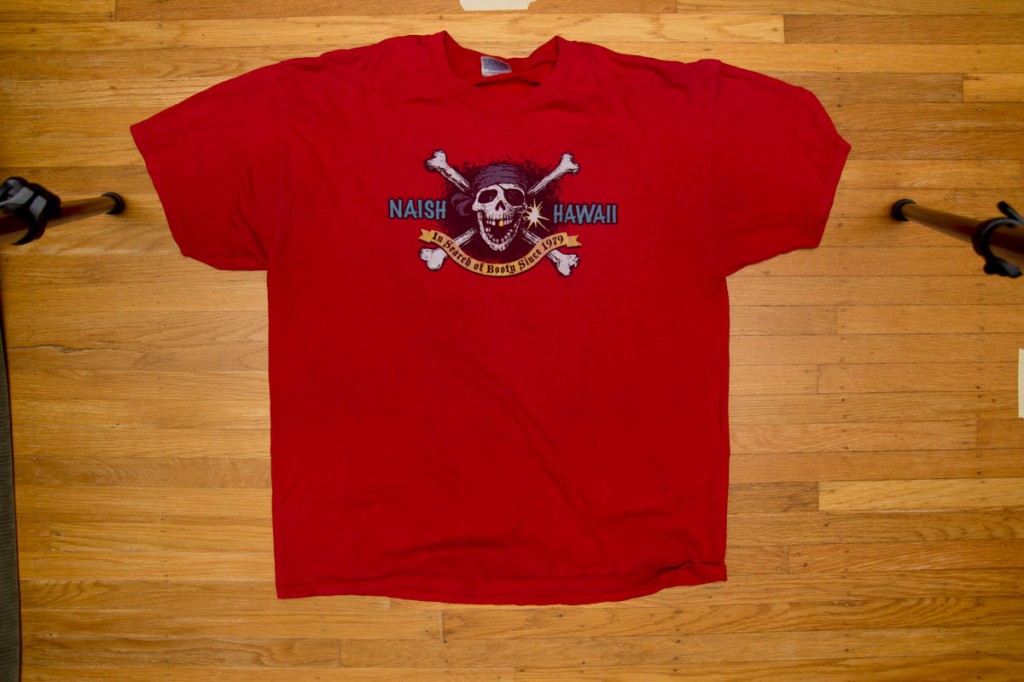
I bought this shirt for one of two interviews I’ve ever been on. The first was the one that resulted in me working at Intel. The second was looking to make a possible switch to Autodesk. I didn’t make the change because I didn’t get the job. They said that there were going with an internal candidate, but honestly, I wasn’t very impressive that day. Perhaps I wouldn’t have hired me either. In retrospect, I’m thankful, however. I sense that I would not have gotten along well with the hiring manager. Also, Robie has a cousin that works there
9 and it appears that the company is incredibly conservative and political. I wouldn’t have lasted.

This Google shirt was given to my by a friend Karthik whose wife works(ed?) there
10. The memorable thing about this shirt is that my second level manager, Avner, asked me about it. I joked “oh, this shirt? I got it when I interviewed with them.” It took him a moment to realize I was joking but the scared look on his face was priceless.
11
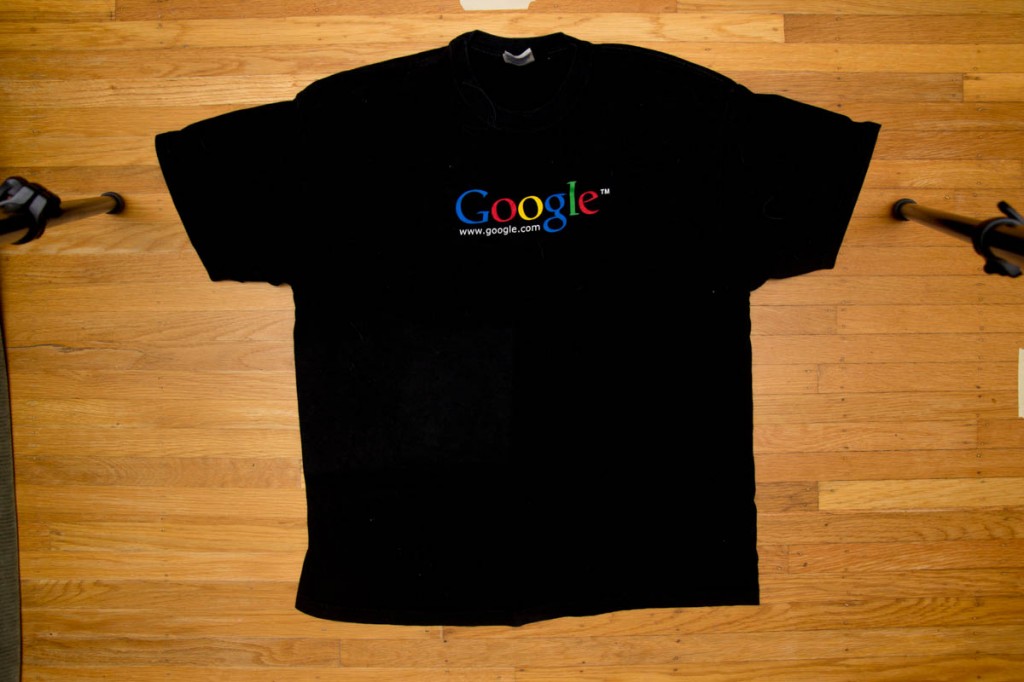
My dept has had a programming contest for a bunch of years. The first year, I managed to get third place with a TCL script. The challenge was to fit a list of rectangles into a minimal circle. Most participants gave C++ based entries. My success with a TCL script shows that the algorithm is more important than language speed.
12. This shirt was my prize.
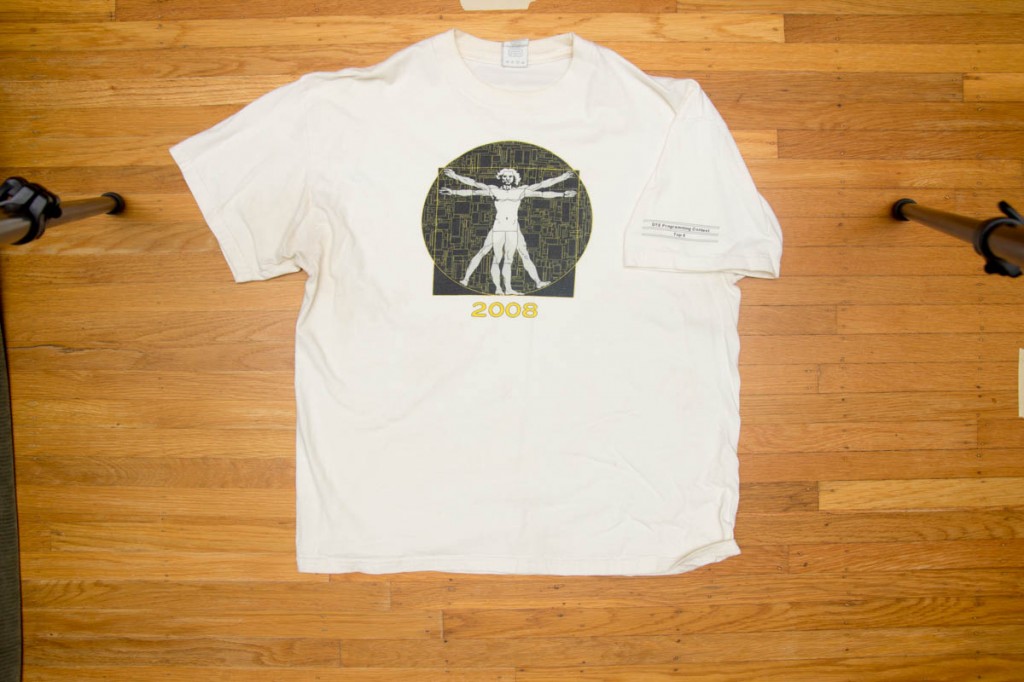
Some years ago, I went an took a
timberframing class. Here are some
pictures.
While my mom was born and raised in a small town in Germany, her dad was from Hungary. By sending out a bunch of letters to people with the same last name, she found some folks in Budapest that we suspect are somehow related to us. I got the shirt below on a visit there. Additional pictures
here
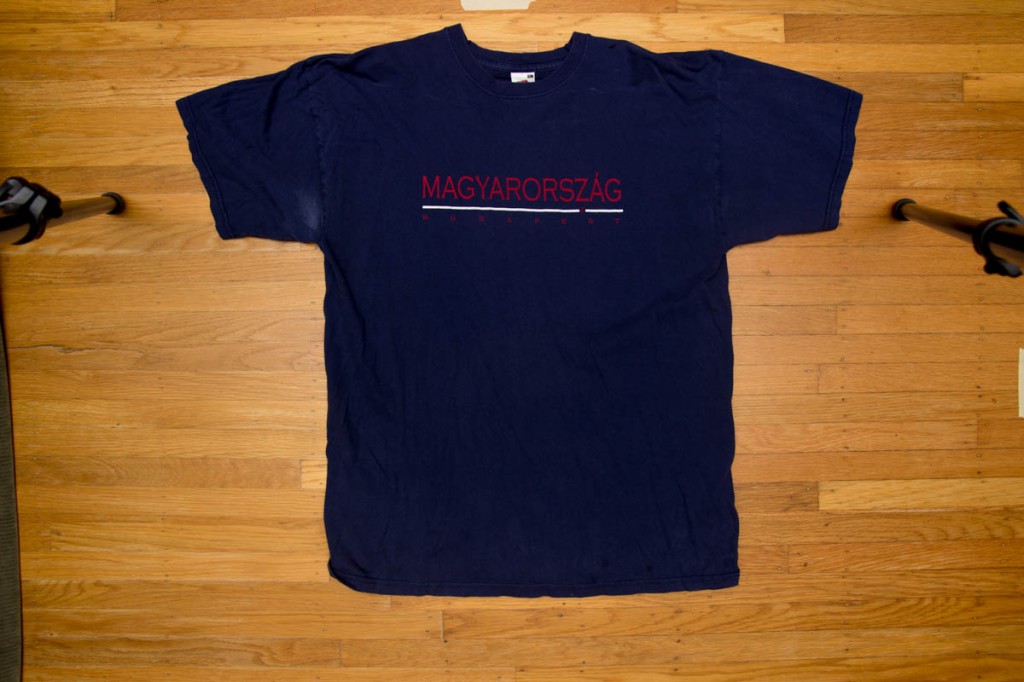
A couple years ago, my department at Intel had a group event that I really enjoyed. During the event, I got the shirt below and made the accompanying horse. The stick it’s on is a broom.

So that’s what I have to say about that. I hope you’ve enjoyed.
Here’s the clothes we’re discarding. Mine, Robie’s and the kids’






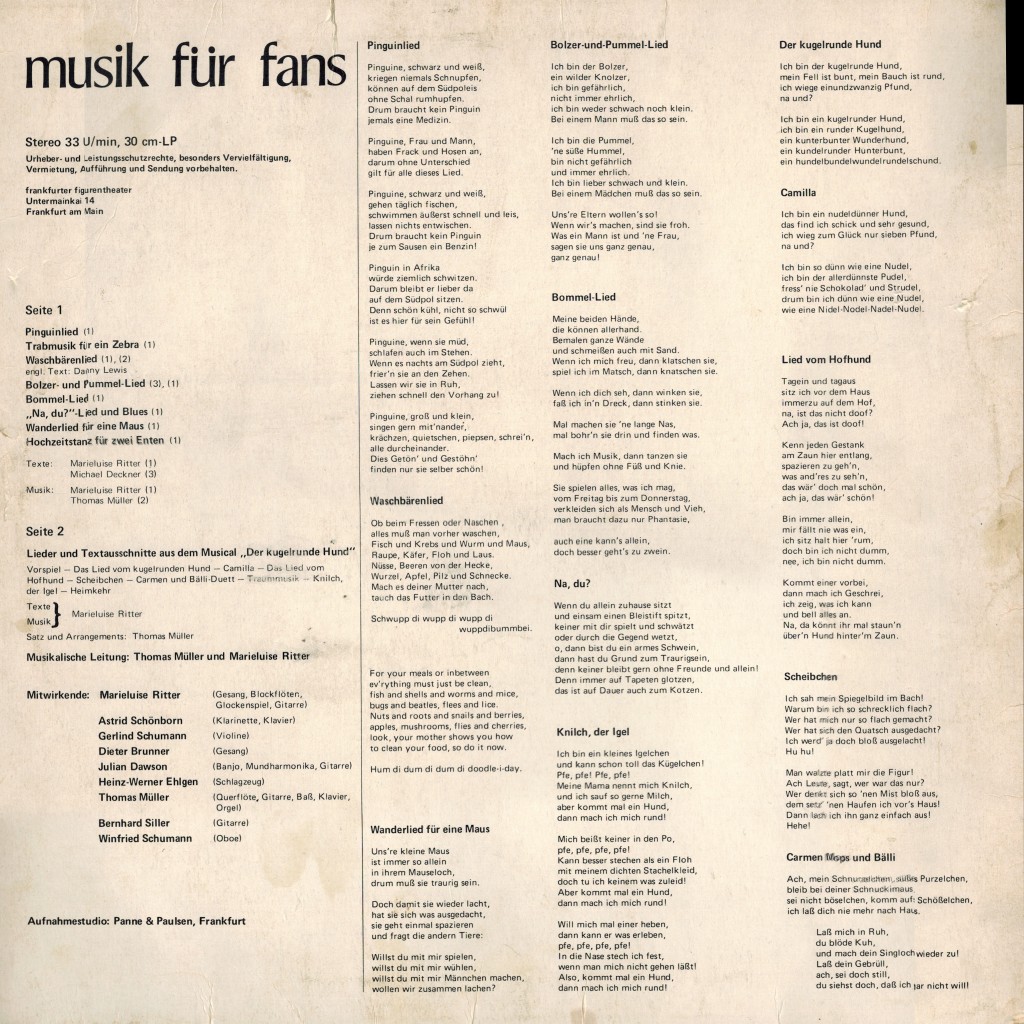


 My junior year, I participated in freshman orientation, which included some community service. Since part of the point of such service is community relations, we all got shirts. This is one of them. After graduation, I used it as a “workin shirt”. Anything that involved grease, paint, or whatever.
My junior year, I participated in freshman orientation, which included some community service. Since part of the point of such service is community relations, we all got shirts. This is one of them. After graduation, I used it as a “workin shirt”. Anything that involved grease, paint, or whatever.

 Most of my career at Intel involved developing/supporting physical design semiconductor CAD tools. In the first year or two, I had the opportunity to go to
Most of my career at Intel involved developing/supporting physical design semiconductor CAD tools. In the first year or two, I had the opportunity to go to 
 This next sweatshirt was given to me by my friend Dorothy, a Wellesley woman I spent a lot of time with. I got it from her for Christmas when she came to visit me and a bunch of other
This next sweatshirt was given to me by my friend Dorothy, a Wellesley woman I spent a lot of time with. I got it from her for Christmas when she came to visit me and a bunch of other  During the 5 years I lived in Silicon Valley, I spent a lot of time “Goin drinkin”, in particular at a dance place called Toons. One of the draws of Toon is their $0.50 10oz beers before 10pm. On many of the nights we’d order 20 of them at 9:55. $10 with a $10 tip. The server wasn’t supposed to do it, and it was through this that I learned the magic of tipping.
On one of the nights that I was there, a local radio station gave away tshirts. Fast forward almost 10 years. I’m working in Oregon talking to my friend/coworker TimJ and he’s wearing the same shirt. Noticing this, I unbutton my collar shirt to reveal my copy. After chatting about it for a minute or two, we decided that we both got our shirts on the same night. Tim spent a bunch of time at Toons as well. Ships passing/dancing in the night.
During the 5 years I lived in Silicon Valley, I spent a lot of time “Goin drinkin”, in particular at a dance place called Toons. One of the draws of Toon is their $0.50 10oz beers before 10pm. On many of the nights we’d order 20 of them at 9:55. $10 with a $10 tip. The server wasn’t supposed to do it, and it was through this that I learned the magic of tipping.
On one of the nights that I was there, a local radio station gave away tshirts. Fast forward almost 10 years. I’m working in Oregon talking to my friend/coworker TimJ and he’s wearing the same shirt. Noticing this, I unbutton my collar shirt to reveal my copy. After chatting about it for a minute or two, we decided that we both got our shirts on the same night. Tim spent a bunch of time at Toons as well. Ships passing/dancing in the night. This sesame street shirt is from my cartoons phase. In addition to this shirt, I also wore a Wiley Coyote hat, an Elmo shirt, and some Winnie the Pooh stuff. The latter spilled over into my friendship/relationship with Rose
This sesame street shirt is from my cartoons phase. In addition to this shirt, I also wore a Wiley Coyote hat, an Elmo shirt, and some Winnie the Pooh stuff. The latter spilled over into my friendship/relationship with Rose  For about two years of my time in Mountain View, I was an assistant scoutmaster with a local troop. I learned a lot through this experience:
For about two years of my time in Mountain View, I was an assistant scoutmaster with a local troop. I learned a lot through this experience:
 Shortly after starting work at Intel, they had a blood drive. The MIT red cross people were great at getting people to donate. I basically gave as frequently as the law allowed. (today, the limit is every 56 days.) A couple weeks after my donation, I got a letter from Stanford medical stating that my blood is negative of a common virus
Shortly after starting work at Intel, they had a blood drive. The MIT red cross people were great at getting people to donate. I basically gave as frequently as the law allowed. (today, the limit is every 56 days.) A couple weeks after my donation, I got a letter from Stanford medical stating that my blood is negative of a common virus  This shirt is one I bought in Germany with my sister Jovan. Jovan was probably 12 at the time and her friends shopped a lot at a little place not far from her school. I remember flirting a bit with the shop owner who was about my age, perhaps a bit older. Through most of my life, this wouldn’t have been that memorable, but it coincided with me finally figuring out the dating thing. I was 24 or 25 at the time. It’s a great shirt and I was tempted to start wearing it again.
This shirt is one I bought in Germany with my sister Jovan. Jovan was probably 12 at the time and her friends shopped a lot at a little place not far from her school. I remember flirting a bit with the shop owner who was about my age, perhaps a bit older. Through most of my life, this wouldn’t have been that memorable, but it coincided with me finally figuring out the dating thing. I was 24 or 25 at the time. It’s a great shirt and I was tempted to start wearing it again. This shirt was bought for me by a girlfriend, Nurith but it was a shopping excursion with her that I initially associated with it during my cleanup.
Nurith and I were at a GAP store in the closeout section. A sales guy came over to see if I needed help. He was a great salesperson, and most important to this memory, probably gay. After we left the store, Nurith commented, half joking, in a catty accent, “I can’t believe he would stand there checkin out my man, right there in front of me!”
This shirt was bought for me by a girlfriend, Nurith but it was a shopping excursion with her that I initially associated with it during my cleanup.
Nurith and I were at a GAP store in the closeout section. A sales guy came over to see if I needed help. He was a great salesperson, and most important to this memory, probably gay. After we left the store, Nurith commented, half joking, in a catty accent, “I can’t believe he would stand there checkin out my man, right there in front of me!”
 This next shirt is a reflection of my side stripes phase. In particular, I remember my first Friday evening living in Israel. I put it on, and went to a local restaurant for dinner. I asked the waitress, where the local dance places are
This next shirt is a reflection of my side stripes phase. In particular, I remember my first Friday evening living in Israel. I put it on, and went to a local restaurant for dinner. I asked the waitress, where the local dance places are  The clothes below were from my Eddie Bauer khaki period. They reflected my dressier side. For about half of my time in Israel, I dated Shlomit and being Israeli, we spent many Friday evenings at her mom’s for dinner with her family. One weekend, while visiting her sister Hani (The H is pronounce like the h in Hanuka), Hani noticed my clothes. Her husband Dror is a banker and she was looking for more casual stuff for him. This was my dressy attire.
I still find that Eddie Bauer fits me best, but it’s not a regular part of the rotation anymore. Khaki is a thing of the past.
The clothes below were from my Eddie Bauer khaki period. They reflected my dressier side. For about half of my time in Israel, I dated Shlomit and being Israeli, we spent many Friday evenings at her mom’s for dinner with her family. One weekend, while visiting her sister Hani (The H is pronounce like the h in Hanuka), Hani noticed my clothes. Her husband Dror is a banker and she was looking for more casual stuff for him. This was my dressy attire.
I still find that Eddie Bauer fits me best, but it’s not a regular part of the rotation anymore. Khaki is a thing of the past.

 This
This 
 This shirt was given to my by Gyuszi on a trip to Hawaii. Somehow, since I’m probably the only black guy he knows
This shirt was given to my by Gyuszi on a trip to Hawaii. Somehow, since I’m probably the only black guy he knows 






